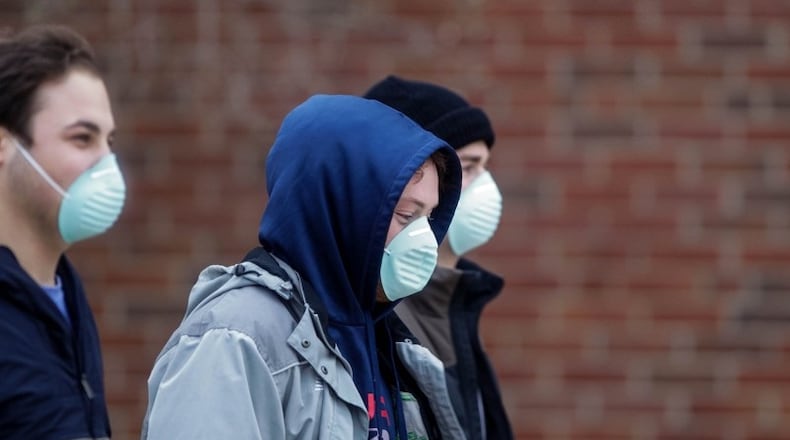On Jan. 27, 2020, the students became the to be tested in Ohio, and those tests were sent to the Ohio Department of Health, then the Centers for Disease Control and Prevention in Atlanta. Even though the students were isolated, two basketball games in Oxford were postponed by the opponents because of the scare.
Nearly one week later, on Feb. 2, the night of the Super Bowl, it was announced the students tested negative for COVID-19. Dr. Amy Acton, then director of the Ohio Department of Health, said “there’s still a lot of concern” at that time at a news conference in Oxford.
No one could have predicted what would happen during the last 12 months.
There have been 25.5 million cases and 425,000 deaths in the U.S. and 31,451 cases and 232 deaths in Butler County, according to the latest statistics.
“It’s been a wild ride that’s for sure,” said Jennifer Bailer, commissioner of the Butler County General Health District. “We had no idea what we were stepping into. Of course, nobody did.”
Bailer believes the Miami “scare” that quickly drew the attention of Gov. Mike DeWine propelled the county and state medical communities to be more collaborative and proactive than other states.
“Allowed us to sound the alarm across the whole state of Ohio,” Bailer said Wednesday while preparing to oversee Butler County residents 80 and older getting their vaccinations at the Butler County Fairgrounds. “It showed that this is real and this could come here. It wasn’t just across the ocean.”
Bailer said days before Miami students returned to campus last year after their winter break, she met with officials at the Miami University Health Services to discuss protocols and procedures if any student complained of coronavirus symptoms.
After hearing about the virus being detected in China, Bailer said she “just sensed this could be bad.”
On Jan. 28, the day officials announced the tests, numerous Miami students wore masks as they walked around campus.
Justin Maschmeyer, then a senior from Chicago, said the situation was “absolutely terrifying” and he bought a mask once he heard the news reports.
He said the situation was “scaring the town.”
Matt Reinberg, then a senior from Illinois, was also wearing a mask because he wanted to do “what was best,” he said.
Jayne Brownell, vice president of Student Life at Miami, remembers hearing reports of the coronavirus in China and being concerned it may be detected in Oxford. When one student reported flu-like symptoms after attending his 8 a.m. class, Brownell said there was “a sense of the unknown” around the campus.
She said university officials were in constant contact with the state and county health departments and Miami followed CDC guidelines. But at the time, Brownell said, the information was constantly changing.
Now, all faculty, staff, students, and visitors are required to wear a facial covering at all times including while inside any campus building and outside while on campus property or on a bus.
Faculty, staff, and students are expected and visitors are strongly encouraged to perform a basic symptom assessment before coming to campus and may not come to campus if they are ill, have COVID-19 symptoms, or have a temperature over 100.4.
There typically are about 17,000 undergraduates on the Oxford campus, but about 2,000 to 3,000 have chosen to take classes remotely, she said. There are about 5,000 students living in residence halls, about 3,000 fewer than last year.
“We have learned so much,” she said. “It’s amazing how much more we know now.”
One Miami student said she always has an “underlying worry” about getting the coronavirus despite taking the necessary precautions.
Ruku Pal, 20, a junior from West Chester, lives off campus and when she returns home after wearing a mask, frequently using hand sanitizer and cleaning her work area. She thinks, “I hope that was enough.”
A few times, she said, a friend has called and said they tested positive for COVID-19. So she must get tested. So far every test has been negative.
Just hearing about positive tests creates “terrifying moments,” Pal said.
Timeline of Ohio’s first coronavirus tests
Jan. 27, 2020: Two Miami students, who traveled to China, report to Student Health Services in Oxford with flu-like symptoms. Students are isolated in their off-campus residence.
Jan. 28, 2020: Miami officials and Butler County and state health officials hold press conference announcing two students are being investigated for potential coronavirus.
Jan. 29, 2020: Tests are overnighted to the Centers for Disease Control and Prevention in Atlanta.
Jan. 29, 2020: Area hospitals start screening patients about their recent travel.
Jan. 30, 2020: Area colleges and universities restrict university-sponsored travel to China.
Jan. 30, 2020: World Health Organization declares coronavirus global health emergency after it spreads to 18 countries.
Feb. 2, 2020: Butler County and state health officials announce the two Miami students are negative for the coronavirus.
SOURCES: Butler County General Health District, Journal-News archives
About the Author


